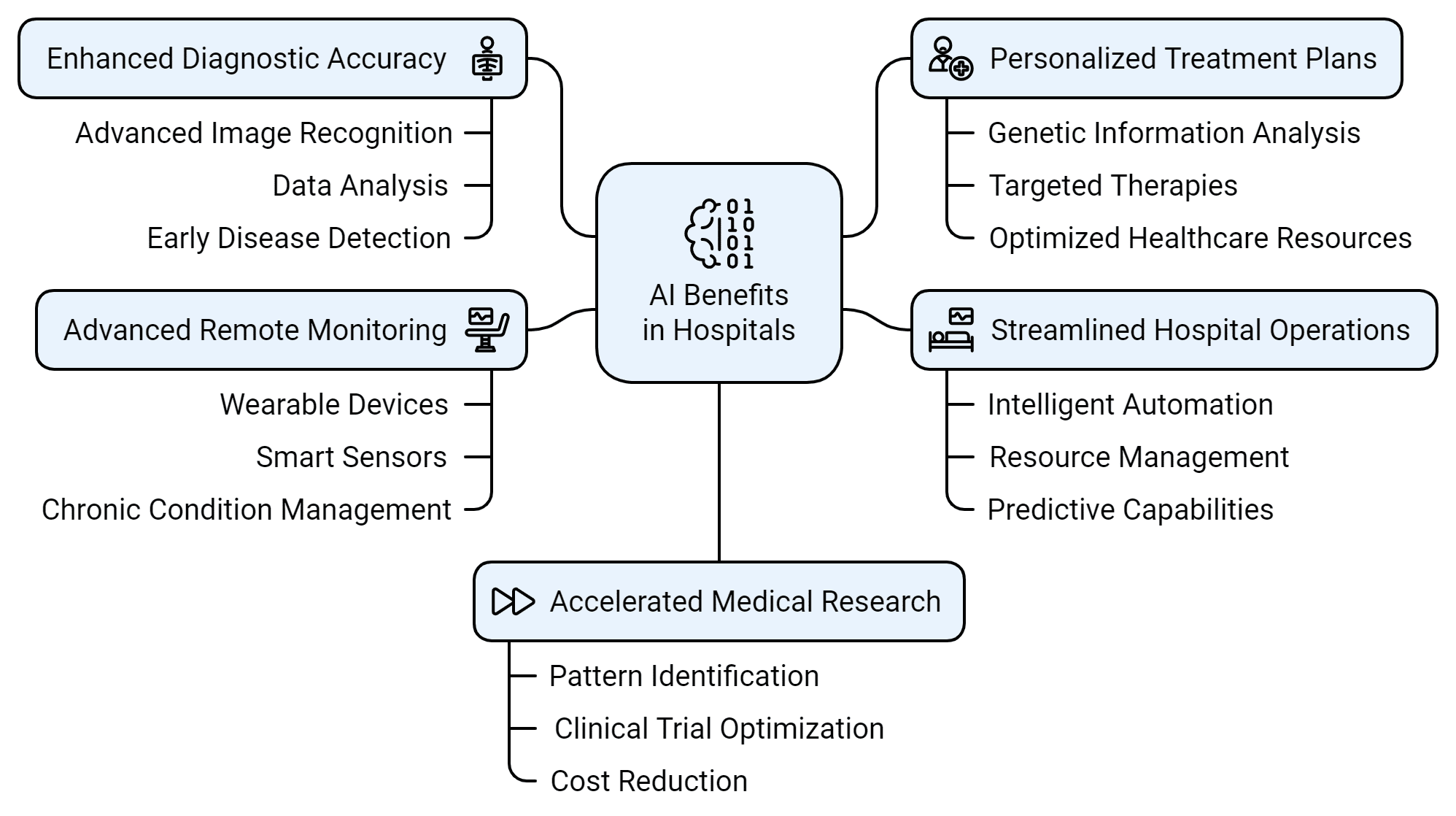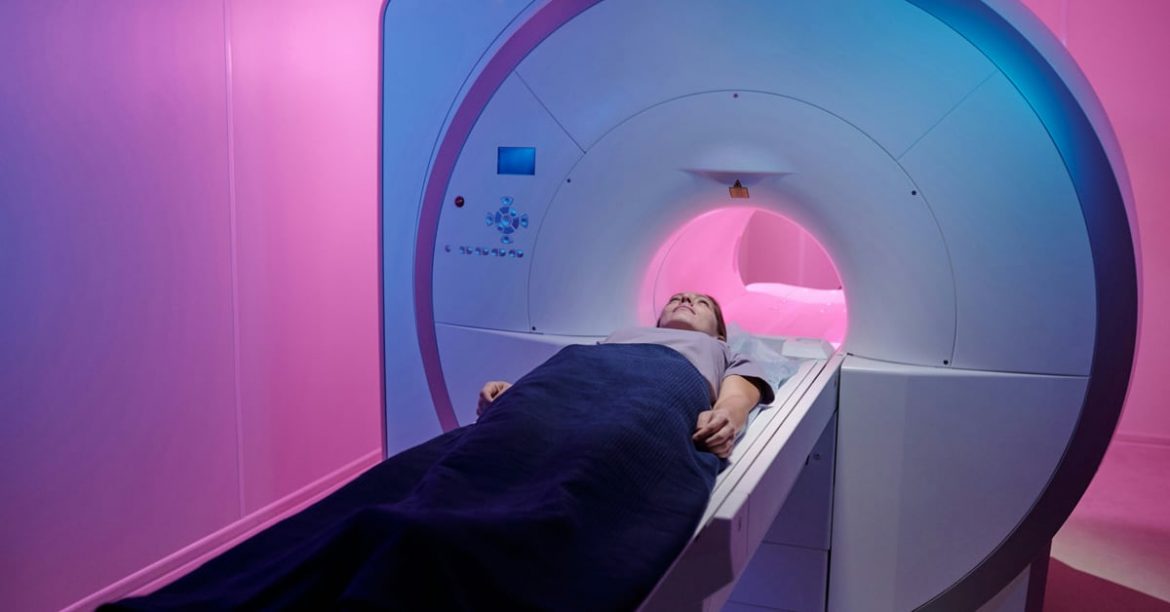Hospitals using artificial intelligence are transforming the healthcare industry by integrating cutting-edge AI technologies into existing medical facilities. These advanced hospitals, sometimes called artificial intelligence hospitals, leverage AI to enhance patient care, streamline operations, and improve healthcare outcomes. In this article, you’ll learn about how hospitals are implementing AI, the importance of this technology, its benefits, and how it’s shaping the future of healthcare.
What Are “Artificial Intelligence Hospitals”?
Hospitals using artificial intelligence are medical facilities that incorporate AI technologies to enhance various aspects of healthcare delivery. While not all these facilities are fully-fledged artificial intelligence hospitals, they utilize machine learning algorithms, data analytics, and advanced robotics to improve patient care, streamline administrative tasks, and support medical decision-making processes. Integrating AI in hospitals represents a significant advancement in using emerging technologies within the healthcare industry.
By leveraging the power of computer science and data science technology, hospitals can process vast amounts of medical data, identify patterns, and generate insights that human healthcare providers might miss. This advanced technology, characteristic of artificial intelligence hospitals, enables more accurate diagnoses, personalized treatment plans, and improved patient outcomes across various medical specialties, all within the framework of existing hospital systems.
Why Is Artificial Intelligence Important in Hospitals?
Artificial intelligence in hospitals is crucial for advancing healthcare delivery and patient outcomes. This technology addresses many challenges traditional hospital operations face, such as reducing medical errors, optimizing resource allocation, and enhancing the overall quality of care. By integrating AI into hospital systems, healthcare providers can make more informed decisions and deliver more efficient, personalized patient care, moving closer to the concept of artificial intelligence hospitals.
The importance of AI in hospitals extends beyond individual patient care. These technologies contribute to the broader advancement of medical research, drug discovery, and public health initiatives. By analyzing large datasets and identifying trends, AI-enabled hospitals can help predict and prevent disease outbreaks, optimize healthcare resource allocation, and contribute to developing new treatments and therapies, all while working within existing healthcare infrastructures.
5 Key Benefits of Hospitals Using Artificial Intelligence
1. Enhanced Diagnostic Accuracy
Hospitals using artificial intelligence significantly improve diagnostic accuracy through advanced image recognition and data analysis. AI algorithms can quickly process medical images, such as X-rays, MRIs, and CT scans, to detect abnormalities with high precision. This capability, a key feature of artificial intelligence hospitals, allows for earlier detection of diseases and more accurate diagnoses, potentially saving lives through timely interventions.
By combining patient data with extensive medical knowledge databases, AI systems can assist healthcare providers in making more informed decisions. This collaboration between human expertise and artificial intelligence leads to more comprehensive and accurate diagnoses, reducing the likelihood of misdiagnosis and improving overall patient outcomes within the hospital setting.
Receive Metaverse Information & Related Topics
2. Personalized Treatment Plans
Hospitals implementing AI excel at creating personalized treatment plans tailored to individual patients’ needs. AI algorithms can recommend targeted therapies and interventions by analyzing a patient’s genetic information, medical history, and lifestyle factors. This level of personalization, often associated with artificial intelligence hospitals, ensures that patients receive the most effective treatments for their specific conditions.
The ability to create personalized treatment plans improves patient outcomes and enhances healthcare delivery efficiency. By tailoring treatments to individual needs, hospitals using AI can reduce the likelihood of adverse reactions, minimize unnecessary procedures, and optimize healthcare resources.
3. Streamlined Hospital Operations
Hospitals using artificial intelligence significantly improve operational efficiency through intelligent automation and resource management. AI systems can optimize patient scheduling, manage inventory, and coordinate staff assignments, reducing wait times and improving patient experience. This streamlined approach to hospital management allows healthcare providers to focus more on patient care and less on administrative tasks, a key advantage of artificial intelligence hospitals.
AI can analyze historical and real-time data to predict patient flow patterns and resource requirements. This predictive capability enables hospitals to allocate staff and equipment more effectively, reducing bottlenecks and ensuring that resources are available when and where they are needed most.
4. Advanced Remote Monitoring
Hospitals leveraging AI can extend care beyond their physical walls through advanced remote monitoring technologies. Wearable devices and smart sensors allow patients to be monitored in real-time from their homes, allowing for early detection of potential health issues. This continuous monitoring, a hallmark of artificial intelligence hospitals, enables healthcare providers to intervene proactively, reducing hospital readmissions and improving long-term health outcomes.
Remote monitoring also enhances the management of chronic conditions, allowing patients to receive ongoing care and support without frequent hospital visits. By analyzing data from remote monitoring devices, AI systems can alert healthcare providers to potential issues, enabling timely interventions and adjustments to treatment plans.
5. Accelerated Medical Research
Hospitals using artificial intelligence contribute significantly to the advancement of medical research. AI algorithms can identify patterns and correlations that might elude human researchers by analyzing vast amounts of patient data and clinical trial results. This capability accelerates the discovery of new treatments, drugs, and therapies, potentially leading to breakthroughs in various medical fields.
AI systems can also optimize the design and execution of clinical trials, identifying suitable participants and predicting potential outcomes. This accelerated research process, typical of artificial intelligence hospitals, not only speeds up the development of new treatments but also reduces the costs associated with medical research, making healthcare innovations more accessible to a broader population.

Comparison of Traditional Hospital Practices vs. AI-Enhanced Practices
AI is reshaping hospital practices. This table compares traditional methods with AI-enhanced approaches in healthcare areas.
| Healthcare Areas | Traditional Hospital Practices | AI-Enhanced Hospital Practices |
| Diagnosis | Primarily human-based | AI-assisted with human oversight |
| Treatment Planning | Based on general guidelines | Personalized and data-driven |
| Resource Management | Manual scheduling and allocation | AI-optimized efficiency |
| Patient Monitoring | Periodic check-ups | Continuous remote monitoring |
| Data Analysis | Limited by human capacity | Large-scale, real-time analysis |
| Research Capabilities | Traditional methods | Accelerated, data-driven research |
| Error Rates | Higher potential for human error | Reduced errors through AI validation |
| Cost Efficiency | Variable, often higher | Improved through optimization |
| Patient Experience | Potentially inconsistent | Enhanced through personalization |
Considerations for Implementing AI in Hospitals
Implementing Artificial Intelligence in hospitals offers transformative benefits but requires careful consideration of various challenges. To ensure successful and ethical AI integration, healthcare institutions must address the following key factors:
- Data Privacy and Security: Integrating AI systems in hospitals requires implementing robust security measures to protect sensitive patient data.
- Ethical AI Use: It is paramount to ensure that AI algorithms are unbiased and ethically implemented to avoid discrimination in healthcare delivery.
- Staff Training: For successful implementation, comprehensive training for healthcare professionals to work effectively with AI systems is essential.
- Integration with Existing Systems: Integrating AI technologies with hospital infrastructure and workflows is critical for optimal performance.
- Regulatory Compliance: Adhering to healthcare regulations and obtaining necessary approvals for AI systems in medical settings is crucial.
Challenges and Future Outlook for Hospitals Using AI
Implementing AI in hospitals presents both significant challenges and promising opportunities. As the healthcare industry addresses these issues, the outlook for AI-driven improvements in patient care remains positive.
- AI Reliability: Ensuring the consistency and reliability of AI systems in critical healthcare decisions remains an ongoing challenge for widespread adoption.
- Human-AI Collaboration: Maintaining high-quality patient care requires striking the right balance between AI assistance and human expertise.
- Cost of Implementation: The initial investment required for AI infrastructure and training can be substantial, potentially limiting adoption in some healthcare settings.
- Continuous Learning: Developing AI systems that can adapt to new medical knowledge and evolving healthcare practices is essential for long-term effectiveness.
- Patient Trust: Building and maintaining patient trust in AI-driven healthcare systems is critical for successfully implementing AI in hospitals.
Revolutionizing Patient Care: Augmented Reality in Healthcare
Augmented Reality (AR) transforms healthcare by overlaying digital information onto the real world, enhancing medical procedures, training, and patient care. This cutting-edge technology improves surgical precision, provides real-time data visualization, and revolutionizes medical education. AR’s potential to increase efficiency and improve patient outcomes makes it a crucial development area in modern healthcare.
In this article, you’ll learn about AR applications in surgery, medical training, patient education, and how they enhance diagnostic capabilities and treatment planning in healthcare settings.
Immersive Healing: Virtual Reality’s Impact on Healthcare
Virtual Reality (VR) reshapes healthcare by creating immersive, computer-generated environments that benefit patients and medical professionals. This innovative technology makes waves in pain management, mental health treatment, rehabilitation, and medical training. VR’s ability to provide controlled, customizable experiences opens new frontiers in therapeutic interventions and medical education.
In this article, you’ll learn about VR applications in pain reduction, exposure therapy, and surgical training and how it’s revolutionizing patient rehabilitation and medical student education in healthcare.
The integration of artificial intelligence in hospitals represents a significant leap forward in healthcare delivery. By embracing these advanced technologies, you can benefit from more accurate diagnoses, personalized treatments, and improved overall care. The future of healthcare is here, and hospitals using AI are leading the way towards a more efficient, effective, and patient-centered medical landscape.
